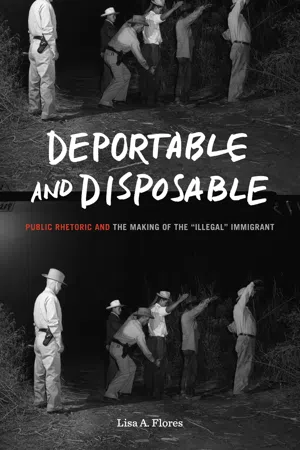
Rhetoric and Democratic Deliberation
Public Rhetoric and the Making of the "Illegal" Immigrant
- 236 pages
- English
- ePUB (mobile friendly)
- Available on iOS & Android
Rhetoric and Democratic Deliberation
Public Rhetoric and the Making of the "Illegal" Immigrant
About This Book
In the 1920s, the US government passed legislation against undocumented entry into the country, and as a result the figure of the “illegal alien” took form in the national discourse. In this book, Lisa A. Flores explores the history of our language about Mexican immigrants and exposes how our words made these migrants “illegal.”
Deportable and Disposable brings a rhetorical lens to a question that has predominantly concerned historians: how do differently situated immigrant populations come to belong within the national space of whiteness, and thus of American-ness? Flores presents a genealogy of our immigration discourse through four stereotypes: the “illegal alien, ” a foreigner and criminal who quickly became associated with Mexican migrants; the “bracero, ” a docile Mexican contract laborer; the “zoot suiter, ” a delinquent Mexican American youth engaged in gang culture; and the “wetback, ” an unwanted migrant who entered the country by swimming across the Rio Grande. By showing how these figures were constructed, Flores provides insight into the ways in which we racialize language and how we can transform our political rhetoric to ensure immigrant populations come to belong as part of the country, as Americans.
Timely, thoughtful, and eye-opening, Deportable and Disposable initiates a necessary conversation about the relationship between racial rhetoric and the literal and figurative borders of the nation. This powerful book will inform policy makers, scholars, activists, and anyone else interested in race, rhetoric, and immigration in the United States.
Frequently asked questions
Information
Table of contents
- Cover
- Half Title
- Series Title Page
- Title Page
- Copyright Page
- Contents
- Foreword
- Abbreviations
- Program
- Welcome to Participants of the 62nd Rencontre Assyriologique Internationale : GRANT FRAME
- Plenary Papers
- Woolley’s Excavations at Ur: New Perspectives from Artifact Inventories, Field Records, and Archival Documentation : RICHARD L. ZETTLER
- Sîn-City: New Light from Old Excavations at Ur : JONATHAN TAYLOR
- Bad Moon Rising: The Changing Fortunes of Early Second-Millennium BCE Ur : KATRIEN DE GRAEF
- Conference Papers : (Alphabetical by Author)
- The Moon Watching Over the Sun and Venus: Revisiting the Attributes and Functions of Nanna/Sîn in Mesopotamia : ISABEL GOMES DE ALMEIDA & MARIA DE FÁTIMA ROSA
- Detecting Social Tensions in the Archaeological Record: Official and Vernacular Figurine-Making Traditions at Ur in the First Millennium BCE : ANASTASIA AMRHEIN
- Old Babylonian Terracottas from Ur: Ancient and New Perspectives : LAURA BATTINI
- Series Page